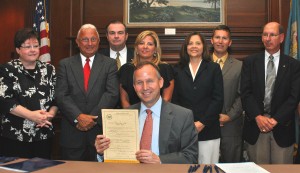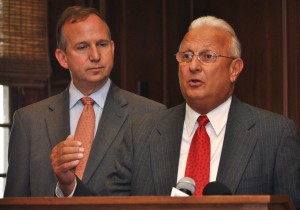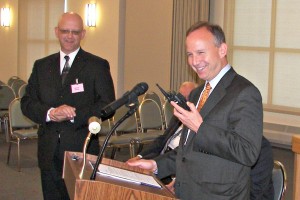HS1 for HB371 enhances information-sharing, improves tracking
DOVER –Governor Markell was joined by legislators, child advocates and community partners at the Children’s Advocacy Center in Dover as he signed legislation today that further protects children who are victims of abuse and neglect. House Substitute 1 for House Bill 371 aims to ensure the investigation and disposition of cases of child abuse and neglect are conducted in a comprehensive, integrated and multi-disciplinary manner, thereby significantly reducing communication and coordination gaps that currently exist. The legislation stems from the work done by the Governor’s Steering Committee on the Protection of Children, in conjunction with recommendations issued by Widener School of Law Vice-Provost and Dean Linda Ammons in the wake of the Dr. Earl Bradley case.
“It is imperative that those involved in investigations or prosecutions of child abuse and neglect, including law enforcement, state agencies and the courts, communicate openly and share the information needed to protect children,” said Governor Markell. “This bill further strengthens Delaware’s child protection network.”
The legislation amends Title 16 of the Delaware Code relating to investigation the abuse of children. Specifically, it requires the Department of Services for Children, Youth and Their Families (DSCYF) to use their case management system to track every case of child abuse reported to the 24-hour child abuse and neglect report line; creates a position within DSCYF, the Investigation Coordinator, whose job will be to track every reported case of child abuse, as well as monitor cases involving death of, or serious injury to, a child or allegations of sexual abuse of a child, from inception to final criminal and civil disposition; and allows the Investigation Coordinator to provide information to the Child Protection Accountability Commission (CPAC), as requested, regarding the status, trends and outcomes of cases of child abuse or neglect that are reported to DSCYF.
“This bill reflects hard work and commitment on the part of all agencies who are partners in protecting children from abuse,” said DSCYF secretary Vivian Rapposelli. “By creating a mechanism for tracking reported cases of abuse, the bill provides us with a critical resource to manage coordination across agencies.”
“The report issued by Dean Ammons highlighted several areas where we as a state could improve how we handle child abuse or neglect cases,” said Rep. Melanie George Smith, D-Bear, the lead sponsor of the bill. “This new law incorporates many of the report’s recommendations to improve reporting and inter-agency communication and to ensure that we as a state are doing everything we can to address child abuse and neglect better and prevent it whenever possible.”
Senate Majority Leader Patricia Blevins, a longtime advocate for protecting children, sponsored the measure in the Senate and said the new law will enhance the state’s ability to protect children from harm. “The changes we’re making with this law are going to make it harder for cases of child abuse and neglect fall through cracks in the system,” said Blevins, D-Elsmere. “By doing that we’re going to make it easier to intervene to protect children whose health and lives might otherwise be at risk.”


